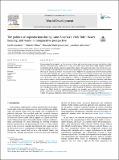The politics of coproduction during Latin America’s ‘Pink Tide’ : water, housing, and waste in comparative perspective
Date
09/2022Metadata
Show full item recordAbstract
Coproduction brings together a diverse range of state and non-state actors to create and deliver public services. These processes, which occur across the Global South, have been widely studied. However, insufficient critical attention has been paid to their politics. We address this gap in the literature by analysing the politics of coproduction in Latin America during the ‘pink tide’ of the early twenty-first century. Drawing on original qualitative research, this article explores the coproduction of three distinct public services—water, housing, and waste—in three countries where left-leaning presidents and governments were elected into office—Ecuador, Bolivia, and Uruguay. We argue that coproduction is intrinsically political in these three cases; that is, the ‘political’ is internal to, and inherent in, coproduction. Our comparative analysis centres on two political dimensions—subject-making and collective autonomy—and shows that tensions around these two issues were central to coproduction in Ecuador, Bolivia, and Uruguay . The article demonstrates the importance of not treating politics as a mere contextual concern in coproduction analysis and shows that coproduction has the capacity to reshape political relationships and subjectivities. Taking politics into account is essential to understanding the dynamics and potential of coproduction in the Global South. Our comparative analysis also provides new insights into Latin American politics, especially concerning 'pink tide' governments and the provisioning of public services.
Citation
Goodwin , G , O'Hare , P , Sheild Johansson , M & Alderman , J 2022 , ' The politics of coproduction during Latin America’s ‘Pink Tide’ : water, housing, and waste in comparative perspective ' , World Development , vol. 157 , 105930 . https://doi.org/10.1016/j.worlddev.2022.105930
Publication
World Development
Status
Peer reviewed
ISSN
0305-750XType
Journal article
Description
This work was supported by The Leverhulme Trust (grant number ECF-2017-091), ESRC studentship (grant number 1211157), the UKRI Future Leaders Fellowship (grant number MR/V022261/1),and the UKRI Future Leaders Fellowship (grant number MR/S03501X/1).Collections
Items in the St Andrews Research Repository are protected by copyright, with all rights reserved, unless otherwise indicated.

